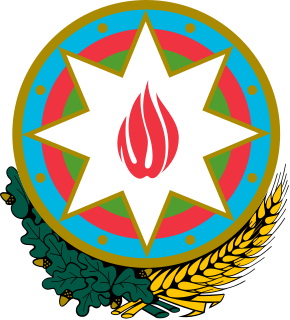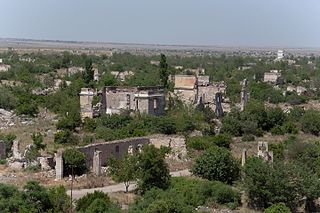
Azerbaijan, officially the Republic of Azerbaijan, is a country located at the boundary of Eastern Europe and Western Asia. It is a part of the South Caucasus region, and is bounded by the Caspian Sea to the east, Russia to the north, Georgia to the northwest, Armenia and Turkey to the west, and Iran to the south. Baku is the capital and largest city.

The Republic of Azerbaijan is a member of the United Nations, the Non-Aligned Movement, the Organization for Security and Cooperation in Europe, NATO's Partnership for Peace, the Euro-Atlantic Partnership Council, the World Health Organization, the European Bank for Reconstruction and Development; the Council of Europe, CFE Treaty, the Community of Democracies; the International Monetary Fund; and the World Bank.

Nagorno-Karabakh is a landlocked region in the South Caucasus, within the mountainous range of Karabakh, lying between Lower Karabakh and Syunik, and covering the southeastern range of the Lesser Caucasus mountains. The region is mostly mountainous and forested.

Azerbaijan, officially the Azerbaijan Soviet Socialist Republic, also referred to as Soviet Azerbaijan, was one of the constituent republics of the Soviet Union between 1922 and 1991. Created on 28 April 1920 when the Russian Soviet Federative Socialist Republic brought pro-Soviet figures to power in the region, the first two years of the Azerbaijani SSR were as an independent country until incorporation into the Transcausasian SFSR, along with the Armenian SSR and the Georgian SSR.

Azerbaijanis or Azeris, also known as Azerbaijani Turks, are a Turkic people living mainly in Northwestern Iran and in the sovereign Republic of Azerbaijan, with a mixed cultural heritage, including Caucasian, Iranian and Turkic elements. They are the second-most numerous ethnic group among the Turkic-speaking peoples after Turkish people and are predominantly Shia Muslims. They comprise the largest ethnic group in the Republic of Azerbaijan and the second-largest ethnic group in neighboring Iran and Georgia. They speak the Azerbaijani language, belonging to the Oghuz branch of the Turkic languages.

Artsakh, officially the Republic of Artsakh, formerly the Nagorno-Karabakh Republic, NKR, is a breakaway state in the South Caucasus supported by Armenia, whose territory is internationally recognized as part of Azerbaijan. Artsakh controls a part of the former Nagorno-Karabakh Autonomous Oblast, including the capital of Stepanakert. It is an enclave within Azerbaijan. Its only overland access route to Armenia is via the 5 km (3.1 mi) wide Lachin corridor which is under the control of Russian peacekeepers.

Agdam District is one of the 66 districts of Azerbaijan. It is located in the west of the country and belongs to the Upper Karabakh Economic Region. The district borders the districts of Khojaly, Kalbajar, Tartar, Khojavend, Aghjabadi, and Barda. Its capital is Agdam, however since the city is completely ruined following its Armenian occupation, the current de facto capital is Quzanlı until Agdam is rebuilt. As of 2020, the district had a nominal population of 204,000.

Shusha or Shushi is a city in Azerbaijan, in the disputed region of Nagorno-Karabakh. Situated at an altitude of 1,400–1,800 metres in the Karabakh mountains, the city was a mountain resort in the Soviet era.

Kalbajar District is one of the 66 districts of Azerbaijan. It is located in the west of the country and belongs to the Eastern Zangezur Economic Region. The district borders the districts of Lachin, Khojaly, Agdam, Tartar, Goranboy, Goygol and Dashkasan districts of Azerbaijan, as well as the Gegharkunik and Vayots Dzor provinces of Armenia. Its capital and largest city is Kalbajar. As of 2020, the district had a nominal population of 94,100.

The Khojaly massacre was the mass killing of Azerbaijanis — mostly civilians, but also armed troops — by local irregular Armenian forces and the 366th Commonwealth of Independent States Guards Motor Rifle Regiment in the town of Khojaly on 26 February 1992. It was one of the four events that defined the war in 1992, along with the Karabakh Armenian seizure of Shusha, the Karabakh Armenian capture of Lachin and the Lachin corridor between Nagorno-Karabakh and Armenia and the June 1992 Azerbaijani offensive against the Mardakert Province in Nagorno-Karabakh.

The Azerbaijan Democratic Republic, was the first successful secular democratic republic in the Turkic and Muslim worlds. The ADR was founded by the Azerbaijani National Council in Tiflis on 28 May 1918 after the collapse of the Transcaucasian Democratic Federative Republic. Its established borders were with Russia to the north, the Democratic Republic of Georgia to the north-west, the Republic of Armenia to the west, and Iran to the south. It had a population of around 3 million. Ganja was the temporary capital of the Republic as Baku was under Bolshevik control. The name of "Azerbaijan" which the leading Musavat party adopted, for political reasons, was, prior to the establishment of the Azerbaijan Democratic Republic in 1918, exclusively used to identify the adjacent region of contemporary northwestern Iran.

The First Nagorno-Karabakh War was an ethnic and territorial conflict that took place from February 1988 to May 1994, in the enclave of Nagorno-Karabakh in southwestern Azerbaijan, between the majority ethnic Armenians of Nagorno-Karabakh backed by Armenia, and the Republic of Azerbaijan. As the war progressed, Armenia and Azerbaijan, both former Soviet Republics, entangled themselves in protracted, undeclared mountain warfare in the mountainous heights of Karabakh as Azerbaijan attempted to curb the secessionist movement in Nagorno-Karabakh. The enclave's parliament had voted in favor of uniting itself with Armenia and a referendum, boycotted by the Azerbaijani population of Nagorno-Karabakh, was held, whereby a majority voted in favor of independence. The demand to unify with Armenia began in a relatively peaceful manner in 1988; in the following months, as the Soviet Union disintegrated, it gradually grew into an increasingly violent conflict between Armenians and Azerbaijanis, resulting in ethnic cleansing, with the Sumgait (1988) and Baku (1990) pogroms directed against Armenians, and the Gugark pogrom (1988) and Khojaly Massacre (1992) directed against Azerbaijanis being notable examples. Inter-ethnic clashes between the two broke out shortly after the parliament of the Nagorno-Karabakh Autonomous Oblast (NKAO) in Azerbaijan voted to unify the region with Armenia on 20 February 1988. The declaration of secession from Azerbaijan was the final result of a territorial conflict regarding the land. As Azerbaijan declared its independence from the Soviet Union and removed the powers held by the enclave's government, the Armenian majority voted to secede from Azerbaijan and in the process proclaimed the unrecognized Republic of Nagorno-Karabakh.

The Nagorno-Karabakh conflict is an ethnic and territorial conflict between Armenia and Azerbaijan over the disputed region of Nagorno-Karabakh, inhabited mostly by ethnic Armenians, and seven surrounding districts, inhabited mostly by Azerbaijanis until their expulsion during the First Nagorno-Karabakh War. Some of these territories are de facto controlled, and some are claimed by the self-declared Republic of Artsakh, although de jure they have been internationally recognized as part of Azerbaijan. The conflict has its origins in the early 20th century, though the present conflict began in 1988, when the Karabakh Armenians demanded transferring Karabakh from Soviet Azerbaijan to Soviet Armenia. The conflict escalated into a full-scale war in the early 1990s which later transformed into a low-intensity conflict until four-day escalation in April 2016 and then escalating into another full-scale war in 2020.

Ilham Heydar oghlu Aliyev is the fourth president of Azerbaijan, serving in the post since 31 October 2003.

Visitors to Azerbaijan must obtain a visa from one of the Azerbaijani diplomatic missions, unless they come from one of the visa exempt countries, countries eligible for visa on arrival or countries eligible for electronic visa. Visitors must hold passports that are valid for at least 3 months beyond the intended period of stay.
The anti-Azerbaijani sentiment, anti-Azerbaijanism, or Azerbaijanophobia has been mainly rooted in several countries, most notably in Armenia and Iran, where anti-Azerbaijani sentiment has sometimes led to violence racial incidents.
Lycée français de Bakou is a French international school in Baku, Azerbaijan founded in 2013 in order to provide education for French speaking foreigners and Azerbaijanis who wish to study French. It serves école maternelle and école primaire directly, while collège and lycée are served with National Centre for Distance Education (CNED). It is affiliated with the Mission Laïque Française (MLF).

Bilateral relations exist between Azerbaijan and Brazil.

Eduard Lintner is a German politician and lobbyist. From 1991 to 1998, he was Parliamentary State Secretary for the Federal Secretary of the Interior and from 1992 to 1998 he was the Drug Enforcement Officer in the Federal Government.
















